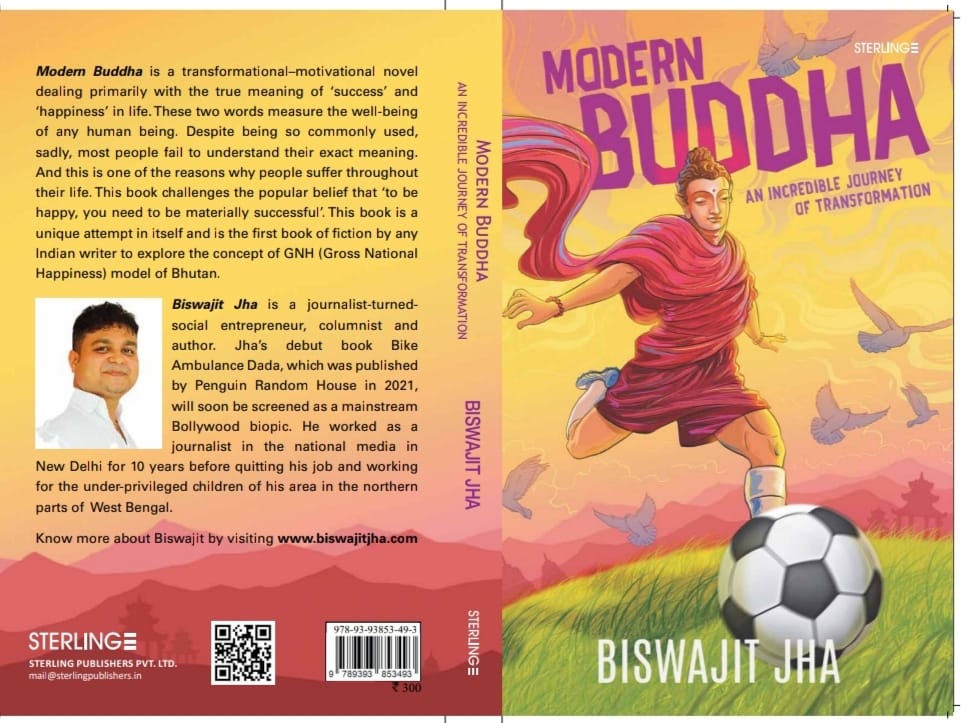In the evocative pages of Biswajit Jha’s “Modern Buddha,” readers are immersed in a narrative that deftly redefines happiness, peace, relationships, and the intricate tapestry of human emotions in the context of the modern world. This novel, set against the backdrop of contemporary India, serves as a profound exploration that prompts us to reconsider our perceptions of these fundamental aspects of life.
At the heart of this transformational journey is Siddhartha, a young man whose fervent passion for football is eclipsed by the shadow of societal conformity and the weight of parental expectations. Siddhartha’s quest for self-discovery becomes a compelling lens through which happiness is redefined.
In “Modern Buddha,” happiness is not a fleeting emotion but a profound revelation. Jha’s portrayal of Siddhartha’s pursuit challenges the conventional belief that happiness is solely derived from external achievements and societal approval. Instead, the novel invites readers to contemplate whether true happiness lies in aligning one’s life with their authentic passions and dreams. Siddhartha’s evolving understanding of happiness encourages us to embark on our own introspective journeys and seek fulfillment within.
The novel also explores the concept of peace, an elusive sanctuary in the fast-paced world we inhabit. Siddhartha’s inner turmoil and conflicts resonate with the struggles many face on the path to inner serenity. Jha masterfully captures the essence of Siddhartha’s journey towards inner peace, reminding us that tranquility is an internal state that transcends external chaos. “Modern Buddha” challenges the notion that peace can only be found in external circumstances, urging us to discover our own inner sanctuaries.
Furthermore, the novel redefines the dynamics of relationships. Siddhartha’s interactions with his family, friends, and mentors are portrayed with depth and authenticity. These relationships serve as pillars of support and personal growth, emphasizing that genuine human connections are essential for navigating life’s challenges and finding fulfillment. Jha’s storytelling highlights the profound impact of authentic relationships on our journeys of self-discovery.
Biswajit Jha’s profound understanding of the intricacies of human emotions is a hallmark of his storytelling in “Modern Buddha.” Through his meticulous character development and vivid prose, Jha portrays the depth and nuances of Siddhartha’s emotional journey with remarkable insight. He deftly captures the turbulence of inner conflicts, the elation of personal triumphs, and the poignancy of human connections. Jha’s ability to convey the subtleties of human emotions allows readers to not only empathize with Siddhartha but also reflect on their own emotional landscapes. It is this emotional depth that makes “Modern Buddha” a profoundly moving and relatable exploration of the human experience.
In conclusion, “Modern Buddha” by Biswajit Jha is a literary triumph that challenges preconceived notions and offers readers a fresh and profound perspective on life’s fundamental aspects. It redefines happiness as an internal quest, peace as an inner sanctuary, relationships as catalysts for personal growth, and human emotions as the essence of our shared humanity. This novel serves as an invitation to embark on our own introspective journeys, prompting us to rediscover and redefine our understanding of happiness, peace, relationships, and the intricate tapestry of human emotions.

